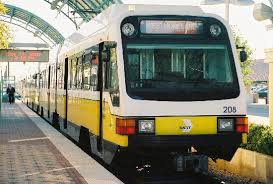In the Doghouse
Search
DART Misses the Mark on Transit Alcohols Ads
July 16, 2013
 Faced with a budget crunch in 2011, the Dallas Area Rapid Transit (DART) board of directors voted to throw out its commitment to public safety and accept alcohol advertisements. Initially, ambiguity in the Alcoholic Beverage Code delayed implementation of the new policy. Now the issue has been settled, and DART officials are looking to cash in. After June 14, when Texas Governor Rick Perry signed an amendment to the Texas Alcoholic Beverage Code into law that will explicitly allow alcohol advertising to be displayed on public transportation vehicles in the state, DART officials wasted no time announcing that the transit agency will now accept alcohol advertisements.
Faced with a budget crunch in 2011, the Dallas Area Rapid Transit (DART) board of directors voted to throw out its commitment to public safety and accept alcohol advertisements. Initially, ambiguity in the Alcoholic Beverage Code delayed implementation of the new policy. Now the issue has been settled, and DART officials are looking to cash in. After June 14, when Texas Governor Rick Perry signed an amendment to the Texas Alcoholic Beverage Code into law that will explicitly allow alcohol advertising to be displayed on public transportation vehicles in the state, DART officials wasted no time announcing that the transit agency will now accept alcohol advertisements.Though the majority of major transit agencies in the US restrict alcohol advertisements, the continued economic uncertainty that many agencies face has created temptation to reverse alcohol ad bans—despite overwhelming evidence that alcohol ads are harmful to youth. The evidence clearly indicates that youth who are exposed to more alcohol ads start drinking earlier, drink more often, and experience more alcohol problems later in life.
With this move, transit officials are making a clear choice between perceived economic gain and the health and safety of Dallas youth. The board's decision to turn its back on public heath simply does not add up: officials predict that revenue from alcohol ads could bring in $400,000 annually—less than 1% of DART’s total operating revenue for 2013. In contrast, underage drinking cost the state of Texas in 2010 an estimated $6 billion. The increased costs of alcohol-related harm will certainly outweigh the meager benefit from a small amount of additional revenue.
In an attempt to justify the decision, Nevin Grinnell, DART’s chief marketing officer, said the agency will distribute alcohol ads evenly, so they aren't concentrated in one particular neighborhood or area, and prioritize ads that encourage consumers to drink responsibly. These promises are far from comforting: responsible drinking messages are the industry's excuse for ineffective prevention that doesn't reduce alcohol consumption or related harm. In fact, studies have suggested that these messages may actually promote drinking. Additionally, numerous studies have shown that outdoor alcohol advertising disproportionately targets minority groups.
Effective regulation of out-of-home (OOH) alcohol advertising is both possible and necessary. Alcohol advertising on public transit exposes youth to harmful images on an ongoing basis. Ads on public transportation are becoming increasingly common and attractive to advertisers as public transportation ridership continues to increase, creating a built-in audience for alcohol advertisements.
Instead of selling out for a quick 0.05% of its total annual revenue, DART officials should continue to prioritize the health of Dallas youth and keep the ban on alcohol ads on vehicles and transit centers.
Help us hold Big Alcohol accountable for the harm its products cause.
| GET ACTION ALERTS AND eNEWS |
STAY CONNECTED    |
CONTACT US 24 Belvedere St. San Rafael, CA 94901 415-456-5692 |
SUPPORT US Terms of Service & Privacy Policy |
Copyright © 2024 Alcohol Justice. All Rights Reserved.
Joomla! is Free Software released under the GNU General Public License.


